Complete Solutions to EXAMPLE of chapter COMPOUNDS OF NON-METALS of Class 10 book with complete answers and questions
| Class 10 | CHEMISTRY |
| Chapter | COMPOUNDS OF NON-METALS |
| BODY BOOKS PUBLICATION | EXAMPLE |
| Number Of Questions | 100 |
| Academic Year | 2023-24 |
Take a little ammonium chloride `(NH_4CI)` in a watch glass and add a little calcium hydroxide `(Ca(OH)_2)` to it. Stir well. Can you sense any smell?
View SolutionShow wet blue and red litmus papers over the watch glass containing soap solution one by one. Which litmus paper shows a colour change ?
View SolutionTake a little ammonium chloride `(NH_4Cl)` in watch glass and a little calcium hydroxide( `Ca(OH)_2` to it. Stir well. Is the gas acidic or basic?
View SolutionWhy ammonia gas is passed over quick lime (CaO)?
View SolutionAmmonia gas is passed over quick lime`(CaO)`.
What may be the reason for collecting ammonia in this manner?
View SolutionAmmonia gas is passed over quick lime`(CaO)`.
What is your inference about the density of ammonia from this?
View SolutionWhat inference can be made about solubility of Ammonia in water?
View SolutionWhat inference can be made about solubility of Ammonia in water?
View SolutionComplete the chemical equation given below and find the product obtained when ammonia is dissovled in water.
View SolutionTick √ which is applicable to am-monia.
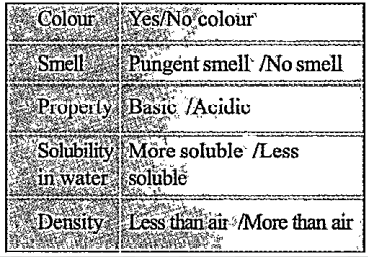
View SolutionWhen an Ammonia tanker leaks, water is sprayed to reduce its inten-sity. What is the reason for this?
View SolutionWrite some uses of ammonia.
View SolutionTake some ammonium chloride `(NH_4CI)` in a boiling tube and heat it. Don't you sense a peculiar smell?
View Solution

Which is the gas evolved here?
View Solution

Show a wet red litmus paper on the mouth of the boiling tube. What change can you observe?
View Solution

Keep the litmus paper for some more time at the mouth of the boil-ing tube and then observe its colour change. What is the change occurred?
View Solution

Write the chemical equation of this reaction.
View SolutionA glass rod dipped in conc. HCI is shown in to the jar which is filled with ammonia. What do you observe?
View Solution

Complete the equation and find out the product?
View Solution

What happens to the white powder on heating?
View SolutionExamine the chemical equation given below and write the forward and backward reaction `N_2(g)+3H_2(g)harr2NH_3(g)`
View SolutionExamine the chemical equation given below and write the forward and backward reaction :`2SO_2 (g)+O_2(g)harr2SO_3(g)`
View SolutionExamine the chemical equation given below and write the forward and backward reactions : `H_2(g)+I_2(g)harr2HI(g)`
View SolutionWhat happens to the rates of forward and backward reactions as time progresses?
View SolutionIdentify the point at which the rates of both forward and backward reactions become equal?
View SolutionThe rate of which reaction increases when the concentration of nitrogen is increased in the manufacture of Ammonia? Forward reaction/Back ward reaction.
View SolutionWhat happens if the concentration of ammonia is increased in the manufacture of Ammonia?
View SolutionWhat will be the effect of removing ammonia continuosly from the system in the manufacture of Ammonia?
View SolutionComplete the table writing the effect of change in concentration in the system at equilibrium.
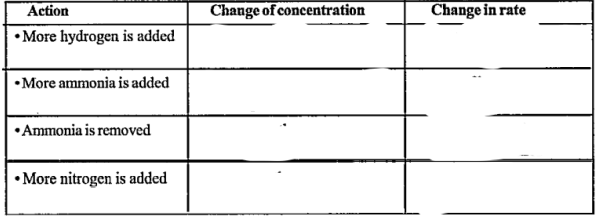
View Solution`N_2(g)+3H_2(g)harr2NH_3(g)` in this equation what is the total number of moles of the reactant molecules.
View Solution
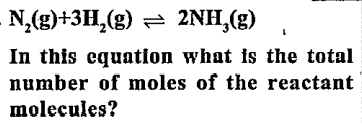
What about the products?
View SolutionIn the manufacture of ammonia, the reaction in which direction result in the decrease in the number of molecules?
View SolutionWhat happens when the pressure of system is decreased?
View SolutionIn manufacturing of ammonia, What if the pressure of the system is decreased?
View SolutionIn the manufacture of ammonia, why is a pressure of 150-300 atm used?
View Solution`H_2(g)+I_2(g)harr2HI(g)` What is the total number of moles of reactants?
View Solution

What about the products?
View Solution`N_2(g)+3H_2(g)harr2NH_3(g)+Heat` Which is the endothermic reaction in this? Forward reaction/Bakward reaction.
View SolutionSulphuric acid is formed also by the direct dissolution of sulphur trioxide in water. Still, sulphur trioxid is not directly dissolved in water. Why?
View SolutionComplete the flow chart.

View SolutionTake 5mL water in a test tube and slowly add concentrated sulphuric acid to it. Touch the bottom of the test tube. What do you feel? Is the reaction exothermic or endothermic?
View SolutionWhat are the constituent elements of sugar?
View SolutionIn constituent of sugar, Which is the black substance in the product formed?
View SolutionWhat is the ratio of hydrogen and oxy-gen is sugar?
View SolutionWhich is the substance that absorbed hydrogen and oxygen from sugar in the ratio as in water?
View SolutionComplete the table by involving the activites given below.
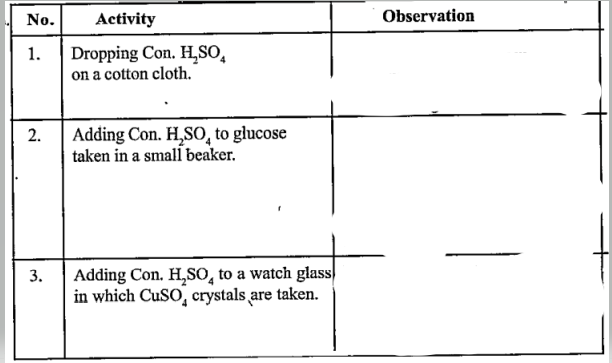
View SolutionWhy is concentrated sulphuric acid not used as a drying agent in the preparation of ammonia?
View SolutionAdd concentrated sulphuric acid to a test tube containing a small quan-tity of carbon. Heat it. What do you observe?
View SolutionAnalyse the chemcial equation and find the reason for your observation. `C^@+2H_2^(+1)"_2S^(+6)O_4^(-2)rarrC^(+4)O_2^(-2)+2H_2^(+1)O^(-2)+2S^(+4)O_2^(-2)` What is the oxidation state of elemental carbon?
View Solution
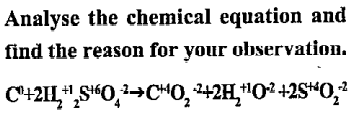
What is the oxidation state of the carbon in carbon dioxide?
View Solution

Was carbon oxidized or reduced in this reaction?
View SolutionWhat is oxidising agent?
View SolutionSee the reaction between concentrated sulphuric acid and copper.
`Cu^@+2H_2^(+1)S^(+6)O_4^(-2)` → `Cu^(+2)S^(+6)O_4^(-2)+S^(+4)O_2^(-2)+2H_2^(+1)O^(-2)`
Is copper oxidized or reduce in this case?
View SolutionSee the reaction between concentrated sulphuric acid and copper.
`Cu^@+2H_2^(+1)S^(+6)O_4^(-2)` → `Cu^(+2)S^(+6)O_4^(-2)+S^(+4)O_2^(-2)+2H_2^(+1)O^(-2)`
Which is the oxidizing agent in this reaction? Which is the reducing agent?
View SolutionAnalyse the given chemcal equation. `Na_2SO_4+BaCI_2 rarr BaSO_4+2NaCI` Which substance is soluble in water among the products?
View SolutionWhen 1 ml Barium Chloride solution is added to the solution given below:

Which substance is the white pre-cipitate?
View SolutionWhen 1 ml Barium Chloride solution is added to the solution given below:

Does the white precipitate dis-solve when dilute hydrochloric acid is added to it?
View SolutionWrite down the observation in the table given below, when 1mL Barium chlo-ride solution is added to the solutions given in the table.

View SolutionIn which of the following rever-sible reactions does change in pressure not influence equili- brium? What is the reason? `H_2(g)+I_2(g)harr2HI`, `N_23H_2(g)harr2NH_3`
View SolutionWhat is the use of appliying high pressure during the formation of ammonia from nitrogen and hydrogen?
View Solution`C(s)+H_2O(g)undersetharr(heat)CO(g)+H_2(g)` Indentify the reactants and products.
View Solution`C(s) + H_(2)O(g)Leftrightarrow CO(g) + H_(2)(g)`
a) Identify the reactants and products.
b) Products are frequently removed from the system. What happen to the system? Explain the reason.
View Solution`2NO(g)+O_2(g)harr2NO_2(g)+heat` In this reaction how do the following changes influence the amount of the product: Decrease in temperature
View Solution`2NO(g)+O_2(g)harr2NO_2(g)+heat` In this reaction how do the following changes influence the amount of the product: Increase in pressure
View Solution`2NO(g)+O_2(g)harr2NO_2(g)+heat` In this reaction how do the following changes influence the amount of the product: Increase in concentration of oxygen.
View Solution`N_2(g)+3H_2(g)harr2NH_3(g)+heat`: What change in pressure is required for the maximum yield of the product?
View Solution`N_2(g)+3H_2(g)harr2NH_3(g)+heat`: What is the change in conce-natration required for increasing the rate of the forward reaction?
View SolutionThe chemcial equation of one of the different stages of manufacturing sulphuric acid by contact process is given below. Find out the influence of the following factors in the reac-tion given below.`2SO_2(g)+O_2(g)harr2SO_3(g)+heat`: Increase the amount of oxygen.
View SolutionThe chemcial equation of one of the different stages of manufacturing sulphuric acid by contact process is given below. Find out the influence of the following factors in the reac-tion given below.`2SO_2(g)+O_2(g)harr2SO_3(g)+heat`: Pressure in increased
View SolutionThe chemcial equation of one of the different stages of manufacturing sulphuric acid by contact process is given below. Find out the influence of the following factors in the reac-tion given below.`2SO_2(g)+O_2(g)harr2SO_3(g)+heat`: Catalyst vanadium pentoxide `(V_2O_5)` is added.
View SolutionThe chemcial equation of one of the different stages of manufacturing sulphuric acid by contact process is given below. Find out the influence of the following factors in the reac-tion given below.`2SO_2(g)+O_2(g)harr2SO_3(g)+heat`: `SO_3` is removed.
View SolutionCalcium oxide (CaO) is used as dry- ing agent in the preparation of Am- monia in laboratory. Can concen- trated `H_2SO_4` be used as drying agent instead of CaO? Justify your answer.
View SolutionWhich property of sulphuric acid is shown in the following situation.
a) During the preparation of chlorine the gas is passed through concentrated `H_(2)SO_(4)`
b) Wooden cupboards appeared to be burnt, when concentrated sulphuric acid happened to fall on it.
View SolutionWhich property of sulphuric acid is shown in the following situation.
a) During the preparation of chlorine the gas is passed through concentrated `H_(2)SO_(4)`
b) Wooden cupboards appeared to be burnt, when concentrated sulphuric acid happened to fall on it.
View SolutionThe graph for the reaction `N_2(g)+3H_2(g)harr2NH_3(g)+heat` is given below.
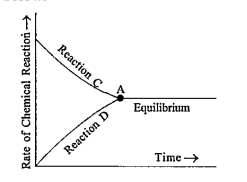 Indentify and write the reactions C and D
Indentify and write the reactions C and D
View SolutionThe graph for the reaction `N_2(g)+3H_2(g)harr2NH_3(g)+heat` is given below.
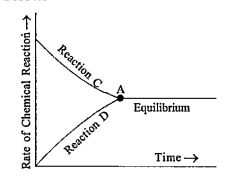 What happens to the position of point A in the graph when a catalyst is used? Redraw the graph.
What happens to the position of point A in the graph when a catalyst is used? Redraw the graph.
View SolutionIt is often said that the production of sulphuric acid is a bench mark of the industrial development of country. Prepare a note based on the various uses of sulphuric acid.
View SolutionFill half of a beaker of capacity 50 mL with sugar. Add concentrated sulphuric acid so that the sugar is immersed in it. Observe the changes. shat are the products formed? Which property of sulphuric acid is revealed here?
View SolutionWhat will be the effect of temperature on a rate of a reaction?
View SolutionWhy rate of a reaction increase when temperature increases?
View SolutionSome chemical reactions are given below.`Zn+2HCIrarrZnCl_2+H_2` `2Mg +02rarr 2MgO`, `NH4Cl↔ NH3+HCl`: What are the peculiarities of first two reactions.
View SolutionSome chemical reactions are given below.
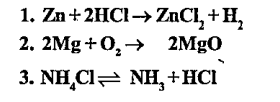
Conduct an experiment for viewing the dissociation and association taking place in the third equation.
View SolutionSome chemical reactions are given below.`Zn+2HClrarrZnCl_2+H_2` `2Mg +02rarr 2MgO`, `NH4Cl↔ NH3+HCl`: In the three reactions reactants turned into product and products are converted into reactents, is it true?
View SolutionSome chemical reactions are given below.`Zn+2HCIrarrZnCl_2+H_2` `2Mg +02rarr 2MgO`, `NH4Cl↔ NH3+HC1`: What type of reactions are they all represent?
View SolutionSome chemical reactions are given below.`Zn+2HCIrarrZnCl_2+H_2` `2Mg +02rarr 2MgO`, `NH4Cl↔ NH3+HCl`: What are the peculiarities of first two reactions.
View Solution`Fe(NO_3)_3+3KCNSrarrFe(CNS)3+3KNO_3`, This balanced chemical equation is wrote on the black board,when the teacher is going to conduct an experiment on chemical equilibrium: In the above reaction, which chemical has red colour.
View Solution`Fe(NO_3)_3+3KCNSrarrFe(CNS)3+3KNO_3`, This balanced chemical equation is wrote on the black board,when the teacher is going to conduct an experiment on chemical equilibrium: In the above reaction, which chemical has red colour.
View Solution`Fe(NO_3)_3+3KCNSrarrFe(CNS)3+3KNO_3`, This balanced chemical equation is wrote on the black board,when the teacher is going to conduct an experiment on chemical equilibrium: In the above reaction, which chemical has red colour.
View Solution
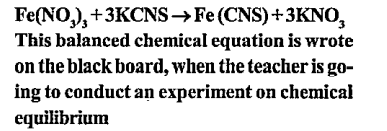
Point out the characteristics of equilibrium based on the experiment done.
View Solution

e. In minute level chemical equilibrium is Kinetic energy why?
View Solution

f. How and when a reversible reaction attain chemical equilibrium
View SolutionConvert the solution reared into four be: In the graph given below, when the react-ent and product attain the level A? What are the characteristics of the point A?
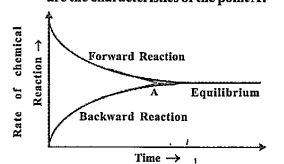
View Solution`N_2+3H_2harr2NH_3`
`H_2+I_2harr2HI`
`N_2O_2(g)harr2NO`
`2SO_2+O_2harr2SO_3`
How amount of the products increases in the above reactions (based on Le chateliers principle) Hints: reference must be given on each of the following: concentration, pressure, temperature and catalyst
View SolutionThegraph showing the progress ofthe re-action `N_2+3H_2harr2NH_3`, is given
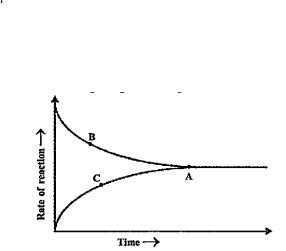 : Identify the reactions represented by B and C?
: Identify the reactions represented by B and C?
View SolutionThe graph showing the progress of the reaction `N_2+3H_2harr2NH_3`, is given
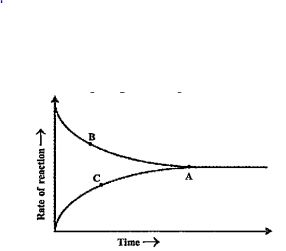
What is the significance of the state A?
View SolutionThe graph showing the progress of the reaction `N_2+3H_2harr2NH_3`, is given
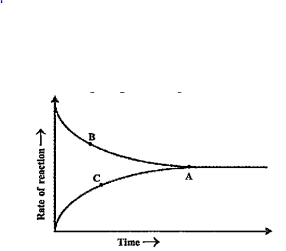
Is there any change in the concentration, as time passes after attaining the stage A? Explain.
View SolutionCold water is taken in one test tube and hot water in another one. Mg ribbon with same size is dropped in each of the test tube: In which test tube, hydrogen is formed with greater speed?
View SolutionCold water is taken in one test tube and hot water in another one. Mg ribbon with same size is dropped in each of the test tube: In which test tube, hydrogen is formed with greater speed?
View SolutionThe chemical equation of the industrial pre-paration of ammonia is given below. `N_2+3H_2harr2NH_3+Heat` Suggest the methods to get more `NH_3`
View Solution`H_2(g)+I_2(g)harr2HI(g)+Heat` How do the following circumstances influence the reaction: Increase the concentration of `H_2`.
View Solution
EXAMPLE questions and complete solutions for chapter COMPOUNDS OF NON-METALS of BODY BOOKS PUBLICATION of Class 10